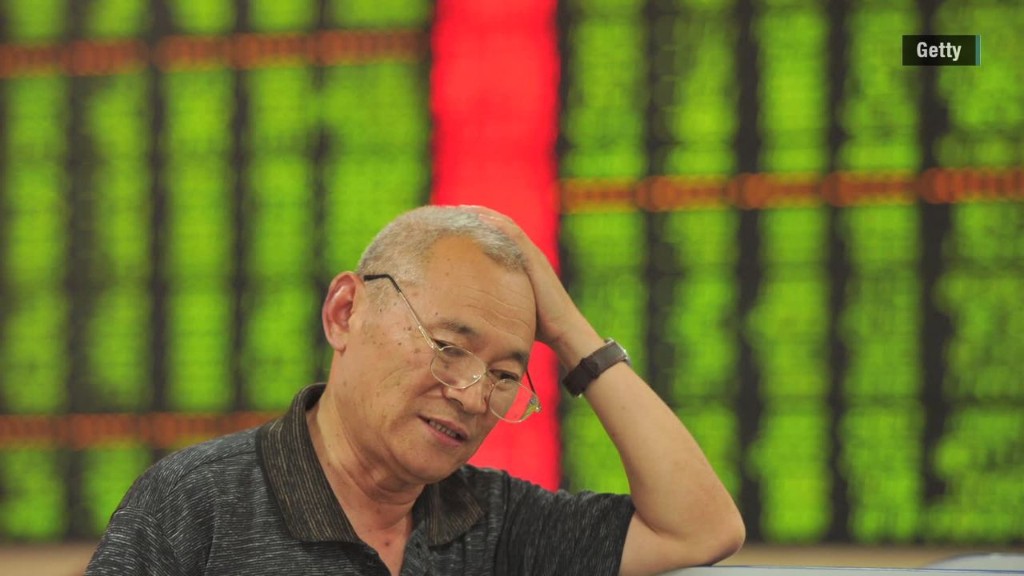
When the bottom fell out of China's stock market last month, the government in Beijing used every trick in the book to stop its dramatic slide.
Until Monday, when the Shanghai Composite lost 8.5%, the intervention appeared to have worked. Investors enjoyed three weeks of relative calm, and recovered some of the $3 trillion wiped out since the market peaked in June.
But was that a good thing, or does the rescue attempt risk longer term damage to China's economy?
The central bank cut interest rates to a record low, regulators suspended new share listings, and threatened to throw short sellers in jail. Other measures were more desperate: Officials organized the purchase of stocks using central bank cash. Companies were allowed to suspend their own shares -- at one point more than half the market was frozen.
Normally, putting the brakes on a stock market panic would be met with universal approval. But the actions of the Communist Party have instead drawn criticism from big investors and economists.
Shanghai stocks had gained roughly 150% over 12 months prior to the crash, despite slower economic growth and weaker company profits. Why act so aggressively to stop a correction in a market that had become so divorced from reality, critics ask? And will Beijing ever allow a greater role for markets?
Related: China's stock market crash...in 2 minutes
China had been edging away from the command and control strategy that prevailed for decades. Reforms meant to strip power from massive state enterprises are underway, and Beijing hopes the yuan will become a currency of global trade and finance.
Signaling a major shift in approach, the Communist Party promised in 2013 that markets would be allowed to play a "decisive" role in the economy.
Critics say that the pledge was discarded in the face of a stock market panic, when officials quickly reverted to old habits.
They may have been trying to protect small investors -- think car mechanics, office workers and shop owners -- from financial ruin. Or perhaps they simply couldn't bear the appearance of having lost control.
"It is understandable in the face of a crisis that unconventional measures may be needed," said Jacqueline Rong, an economist at BNP Paribas.
Other steps, such as requiring listed companies to publish good news, were overdone, she added.
Related: China's economy is getting sick. Will it infect America?
Hedge fund managers, never the biggest fans of government intervention, were particularly horrified by Beijing's response to the crash. Industry titans Paul Singer, Bill Ackman and Richard Perry, appearing at a recent conference in New York, all panned the rescue attempt.
"All of a sudden you can't trade and don't even know a rough price ... and your brokerage firm has become insolvent," Singer said.
Instead of wading in, they say, Beijing could have used the episode to reinforce the principle of risk -- after all, even with recent declines, the Shanghai Composite is still up 75% over the past year.
In an economy where companies facing default are almost always rescued by the government, more risk in the system might have been viewed as a positive development.
Experts say Beijing's intervention could have serious consequences.
According to Rong, index provider MSCI may put the brakes on including China shares in its emerging market benchmark. That would mean China remains off limits for many major international investors.
And the International Monetary Fund, which appeared to be headed toward including the yuan in its reserve basket of currencies, may now reconsider.
Related: China stocks are still not ready for primetime
Former U.S. Treasury Secretary Henry Paulson, who has a close relationship with Beijing, said reforms have transformed China's economy, but its financial markets have lagged behind.
"While Beijing's instinct to protect investors is understandable, the best way of doing so is to create a modern capital market," he wrote in the Financial Times. "Top Chinese policymakers know they must expend greater energy to execute the reform agenda President Xi Jinping laid out 20 months ago."
Paulson, who recently published a book about his dealings with Chinese officials, recommended Beijing stay the course.
"Recent market tremors have led to some scapegoating of foreign speculators," Paulson said. "This volatility should be seen instead for what it is: a sign that financial reforms have yet to be fully realized."


